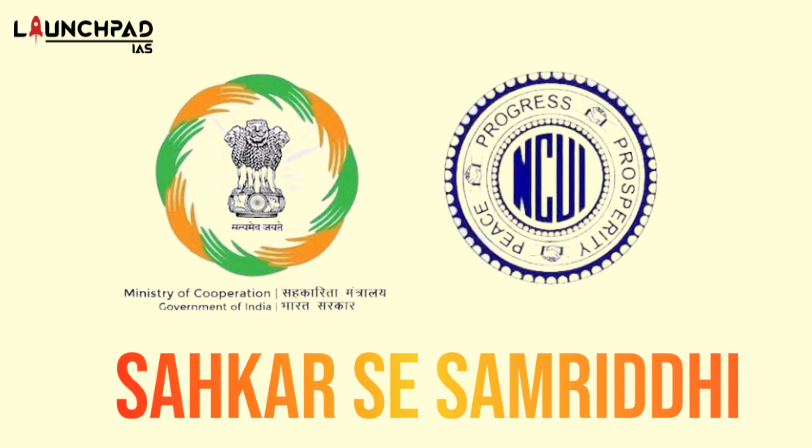- A new National Cooperation Policy is being formulated by the government for which consultation has been started by various stakeholders like central and state governments, cooperative federations, NABARD, etc.
- Sahkar Se Samriddhi has been proposed to strengthen cooperatives by bringing transparency, modernization, and creating competitiveness.
Ministry of Cooperation
- A separate Ministry of Co-operation has been created by the Government to realize the vision of Sahkar se Samriddhi.
- The ministry would provide a separate administrative, legal, and policy framework for strengthening the cooperative movement in the country.
- It would deepen Co-operatives as a true people-based movement reaching up to the grassroots.
- Sahkar Se Samriddhi would work to streamline processes for ‘Ease of doing business’ for co-operatives and enable the development of Multi-State Co-operatives (MSCS).
What Is Cooperative Movement?
- Cooperatives by definition are organizations formed at the grassroots level by people to harness the power of collective bargaining towards a common goal.
- The State Government can control the cooperative societies related to agriculture and cooperation since agriculture and cooperation are on the state list.
- A majority of the cooperative societies are governed by laws in their respective states, with a Cooperation Commissioner and the Registrar of Societies as their governing office.
Facts About Cooperatives
- 8.5 lakh registered cooperatives with 30 crore members.
- Cooperatives cover 99% of Indian villages and 71% of rural households.
- 19% of agriculture finance is through cooperative societies.
- 1528 registered societies under the Multi-State Cooperative Societies Act 2002 which include 66 Multi-State Cooperative Banks with deposits of approx. Rs 2.6 lakh crore.

Challenges In Cooperative Sector (Shivaji Rao Patil Committee On Cooperatives (2019)
- Lack of Participatory Character: The success of cooperatives hinges on the active and sustained participation of all the members. However, it has been compromised due to:
- Free rider problem as people usually join cooperatives to obtain benefits such as financial support from the government.
- Legal loophole: State cooperative acts allow even the non-active members to participate in meetings, exercise voting rights, and be elected on the Board. Dominated by few rich and powerful members thus goes against the democratic nature of such institutions. For example, sugarcane cooperatives in Maharashtra are dominated by rich politicians. Restricted Coverage to only one or two villages. As a result, their resources remain limited and hence remain unviable. Restricted role: Most of the societies are single-purpose societies with limited roles. For example, Primary agricultural credit cooperative societies (PACS) are involved mainly in giving loans to members and do not take up other roles such as facilitating the adoption of mechanization, buying of inputs in bulk, etc. Politicization of cooperatives: The infusion of share capital by the Government enables it to have control over cooperatives. Further, there have been instances of a political party in power assuming control over large-sized cooperatives through methods such as appointing an active member of the party to the position of Chairman, nominating persons, and issuing directions to the board.
- Restrictive state cooperative societies’ acts have affected the functional autonomy and democratic character of the cooperatives. Some of these provisions include Giving directions to co-operatives “in the public interest”; Nomination persons on the management committee/Board; Postpone elections; Supersede committees/boards, disqualifying members Governance issues such as Poor Regulation and audit by Registrar of cooperative societies, delaying and disputes regarding holding elections, financial frauds, corruption. For example, poor governance of Primary Urban Cooperative Banks (UCBS) has led to an increase in NPAS.
- Absence of skilled professionals: Most of the states do not have a dedicated cadre of officials for the management of cooperatives. Quite often, the State Government officials who do not have expertise in the management of cooperatives get deputed to such institutions. Further, these officials changed too frequently resulting in a lack of accountability and thus affecting the business of the cooperatives.
- Lack of Adequate Capital: The amount of capital raised by cooperatives from members if quite low. Further, while corporate entities can raise equity as well as borrow from the market, cooperatives do not have access to capital markets. The poor financial position of rural credit cooperatives has led to its lower share in agricultural finance (19%). Increase in several sick cooperatives particularly in the processing sector such as sugar, textiles, and vegetable oil.


